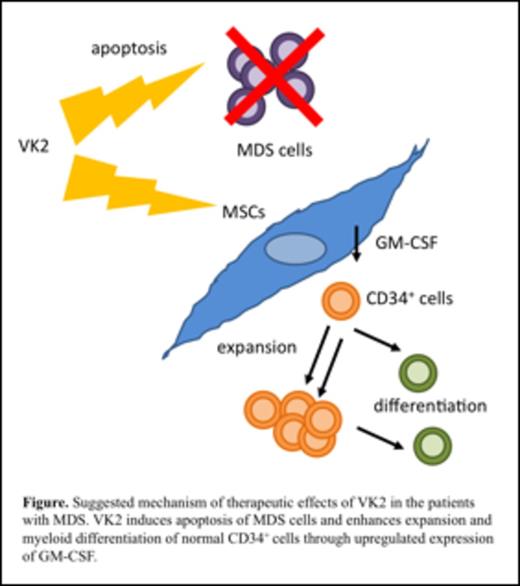Abstract
[Background] Myelodysplastic syndrome is an intractable disorder characterized by ineffective hematopoiesis. Although allogeneic hematopoietic stem cell transplantation is the only curative therapy for eligible patients, hematopoiesis-supportive pharmacotherapy is practically important for transplant-ineligible patients to overcome transfusion dependency and infections. Vitamin K2 (VK2, menatetrenone) is a drug used to aim at improvement of hematopoiesis in MDS patients (Leukemia 14: 1156, 2000). However, the exact mechanism how VK2 improves hematopoiesis remains largely unknown. It was reported that VK2 induces MDS cells to undergo apoptosis (Leukemia 13: 1399, 1999). Here, we investigated our hypothesis that VK2 exerts its hematopoiesis-supportive effects through acting on mesenchymal stem/stromal cells (BM-MSCs) in the bone marrow microenvironment.
[Methods] Normal bone marrow (BM) samples from healthy adult volunteers were purchased from AllCells (Emeryville, CA). BM-CD34+ cells were isolated from BM-mononuclear cells using anti-CD34 immunomagnetic microbeads (Miltenyi Biotec, Bergisch Gladbach, Germany). Human BM-MSCs were isolated according to our previously published methods (Stem Cells 32:2245, 2014). In co-culture experiments, BM-MSCs with or without VK2 treatment were seeded on a 24-well culture plate. BM-CD34+ cells were applied on the MSC-grown plate and co-cultured in SFEM (StemCell Technologies, Vancouver, Canada) supplemented with 100 ng/mL SCF, 100 ng/mL Flt-3 ligand, 50 ng/mL TPO and 20 ng/mL IL-3. After 10 days of co-culture, the number and surface marker expression of the expanded hematopoietic cells were examined by flow cytometric analysis.
[Results] We first tested the direct effect of VK2 on BM-CD34+ cells. BM-CD34+ cells were treated with VK2 at various concentrations ranged from 0 µM to 10 µM for 24 hours and then cultured in SFEM in combinations with cytokines. Surprisingly, viable hematopoietic cells were hardly detected in the expansion culture of BM-CD34+ cells treated with 10 µM VK2. Even with 1 µM treatment, the number of CD45+ cells was decreased, as compared to that of expansion culture of untreated BM-CD34+ cells. The apoptosis analysis showed that the percentage of AnnexinV+ PI+ cells in the expanded hematopoietic cells is increased by VK2 treatment. We next examined the effect of VK2 on the hematopoiesis-supportive capability of BM-MSCs. BM-MSCs were pretreated with VK2 at various concentrations and then co-cultured with BM-CD34+ cells. The numbers of CD34+ cells and CD45+ cells were increased in a VK2 dose-dependent manner. These results demonstrated that VK2 shows different effects on distinct stem/progenitor cells: the induction of apoptosis in BM-CD34+ cells and the enhancement of hematopoiesis-supportive capability of BM-MSCs. We then investigated whether apoptosis-related cell death of BM-CD34+ cells by VK2 treatment is ameliorated in the presence of BM-MSCs. Both BM-CD34+ cells and BM-MSCs were treated with VK2 for 24 hours, and then co-cultured. The number of CD34+ cells was not decreased significantly in contrast to its severe decrease in single culture of VK2-treated BM-CD34+ cells.
We further analyzed the effect of VK2 on BM-MSCs. Subpopulation analysis in co-culture of CD34+ cells with VK2-treated BM-MSCs showed that the expansion efficacy of CD34+CD38+ cells is higher in comparison to that of CD34+CD38- cells. In addition, the percentages of CD34-CD33+ cells and CD34-CD13+ cells were higher than those in co-cultures with untreated BM-MSCs. Therefore, VK2-treated BM-MSCs supported the expanded CD34+ cells to skew their phenotype toward myeloid lineage. The presence of a transwell in the co-culture system was unrelated to the expansion pattern of CD34+ cells, which suggested the involvement of soluble factors with respect to the underlining mechanism. We therefore compared the levels of hematopoiesis-supporting cytokine mRNA expression in VK2-treated and untreated BM-MSCs: VK2-treated BM-MSCs showed lower expression of CXCL12/SDF-1 mRNA and a trend toward higher expression of GM-CSF mRNA.
[Summary] VK2 acted on BM-MSCs to support their ability to enhance expansion and myeloid differentiation of BM-CD34+ cells probably via altered GM-CSF and CXCL12/SDF-1 expression in MSCs. These findings may help to identify the mechanisms of therapeutic effects of VK2 in patients with MDS (Figure).
No relevant conflicts of interest to declare.
Author notes
Asterisk with author names denotes non-ASH members.


